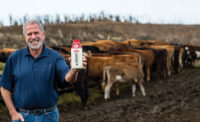Growth Without Hormones
I’ve been immersed
in the feel-good aspects of dairy for the past month or so — first a
trip to Maine for this month’s cover story, then editing our organic
report in this issue after returning from a visit to our Processor of the
Year (to be revealed next month).
Consumers are demanding organic milk faster than the
nation’s limited number of certified organic dairy cows can produce.
To try and capture a piece of their business, some processors are meeting
them halfway by turning away milk from cows treated with artificial growth
hormones.
Oakhurst Dairy (page 18) has steered clear of
artificial hormones from day one. It was a key point of differentiation
over its much larger competitors in New England until this year, when HP
Hood and Dean’s Garelick Farms announced they’d stop accepting
milk from treated cows. Earlier this summer, Dean’s Tuscan Farms
plant in New Jersey stopped accepting milk from treated cows, matching the
longtime policy of metro New York competitor Farmland Dairies.
Dean folks have reportedly said this is not intended
as national policy but as a response to consumer demand, noting that some
Dean-owned dairies in California have already gone rBST-free.
True, this segment still represents a small percentage
of the overall market for milk; IDFA reports only 30 percent of consumers
are aware of hormone issues in milk, and 70 percent of those aware
don’t care. But with the nation’s largest processor moving in
this direction, what does this mean for Monsanto, the sole manufacturer of
Posilac?
The agriscience company has released “Dairying
Equals Choices,” a sort of playbook for how dairy farmers should
handle processor demands for milk from untreated cows. For example, many
processors pay premiums to producers for rBST-free milk, and
Monsanto’s pamphlet calculates how much that premium should be based
on assumed lost production from not using Posilac.
It also urges farmers to bring examples of
“misleading labeling” to their attention, something that formed
the basis of Monsanto’s lawsuit against Oakhurst over the
processor’s rBST-free declaration. The subsequent settlement led to
the “FDA says there’s no difference” statement seen on
rBST-free milk labels today.
The arguments will continue over whether or not the
use of artificial hormones is good or bad for animals and humans. I expect
the debate will rage regardless of science’s future conclusions.
Many people just don’t like their food messed
with, and data indicates those folks are growing in number. A processor
would be a fool not to keep a close eye on this trend.
$OMN_arttitle="Growth Without Hormones";?>